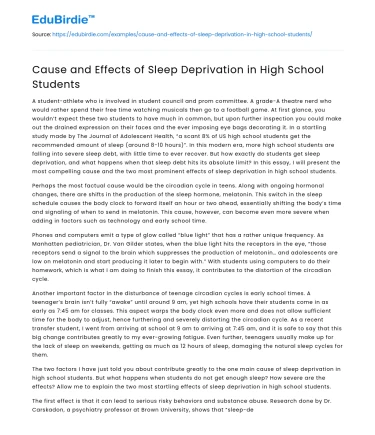A student-athlete who is involved in student council and prom committee. A grade-A theatre nerd who would rather spend their free time watching musicals then go to a football game. At first glance, you wouldn’t expect these two students to have much in common, but upon further inspection you could make out the drained expression on their faces and the ever imposing eye bags decorating it. In a startling study made by The Journal of Adolescent Health, “a scant 8% of US high school students get the recommended amount of sleep (around 8-10 hours)”. In this modern era, more high school students are falling into severe sleep debt, with little time to ever recover. But how exactly do students get sleep deprivation, and what happens when that sleep debt hits its absolute limit? In this essay, I will present the most compelling cause and the two most prominent effects of sleep deprivation in high school students.
Perhaps the most factual cause would be the circadian cycle in teens. Along with ongoing hormonal changes, there are shifts in the production of the sleep hormone, melatonin. This switch in the sleep schedule causes the body clock to forward itself an hour or two ahead, essentially shifting the body’s time and signaling of when to send in melatonin. This cause, however, can become even more severe when adding in factors such as technology and early school time.
Save your time!
We can take care of your essay
- Proper editing and formatting
- Free revision, title page, and bibliography
- Flexible prices and money-back guarantee
Phones and computers emit a type of glow called “blue light” that has a rather unique frequency. As Manhatten pediatrician, Dr. Van Gilder states, when the blue light hits the receptors in the eye, “those receptors send a signal to the brain which suppresses the production of melatonin… and adolescents are low on melatonin and start producing it later to begin with.” With students using computers to do their homework, which is what I am doing to finish this essay, it contributes to the distortion of the circadian cycle.
Another important factor in the disturbance of teenage circadian cycles is early school times. A teenager’s brain isn’t fully “awake” until around 9 am, yet high schools have their students come in as early as 7:45 am for classes. This aspect warps the body clock even more and does not allow sufficient time for the body to adjust, hence furthering and severely distorting the circadian cycle. As a recent transfer student, I went from arriving at school at 9 am to arriving at 7:45 am, and it is safe to say that this big change contributes greatly to my ever-growing fatigue. Even further, teenagers usually make up for the lack of sleep on weekends, getting as much as 12 hours of sleep, damaging the natural sleep cycles for them.
The two factors I have just told you about contribute greatly to the one main cause of sleep deprivation in high school students. But what happens when students do not get enough sleep? How severe are the effects? Allow me to explain the two most startling effects of sleep deprivation in high school students.
The first effect is that it can lead to serious risky behaviors and substance abuse. Research done by Dr. Carskadon, a psychiatry professor at Brown University, shows that “sleep-deprived teens are far more likely to use stimulants like caffeine and nicotine to get through the day but also to deal with sleep-related negative moods by self-medicating with alcohol. They’re also more likely to engage in unprotected sex and reckless driving than teens who get upwards of 7 hours of sleep a night because they lack impulse control and suffer from impaired judgment that leads to poor decision-making.” These risky behaviors are further increased because high school students lack a mature, important part of the brain called the frontal lobe, which is responsible for decision making and impulsive behavior.
Another effect of sleep deprivation is an increased risk of injuries. According to a National Sleep Foundation study, fatigue is the leading factor in at least 100,000 traffic accidents each year. One North Carolina state study found that 55% of “fall asleep” crashes were caused by drivers who were under the age of twenty-five. Now imagine sleep-deprived high school students driving to school? That itself is a major red flag for the well being of those students and drivers around them. However, car crashes aren’t the only aspect in an increased risk of injuries, Sleep-deprived students are more prone to accidents such as cutting oneself’s fingers, falling down the stairs, or even choking on food or beverages. I would know of this because I have injured myself by accident because of sleep deprivation by dropping a cup of hot, boiling coffee on my feet. I’m not even a coffee drinker.
As a current high school student, I myself struggle with the battle of sleeping when I should be or staying up to finish assignments. Especially in my junior year, where I am desperately trying to catch up to my classmates all while trying to submit assignments from various classes, the amount of sleep I am getting steadily decreases, all while the effects increases. I know I have injured myself, that for sure is true, but sleep deprivation comes with psychological and physical effects too. I have become moodier, more ill-tempered to my family, and more kept with myself than I usually am. I have lost scarily amount of weight in such a small time period, I have lost my appetite, and the eye bags seem to get deeper and deeper each hour. I just hope this dangerous sacrifice gets me an A at the end.






 Stuck on your essay?
Stuck on your essay?

